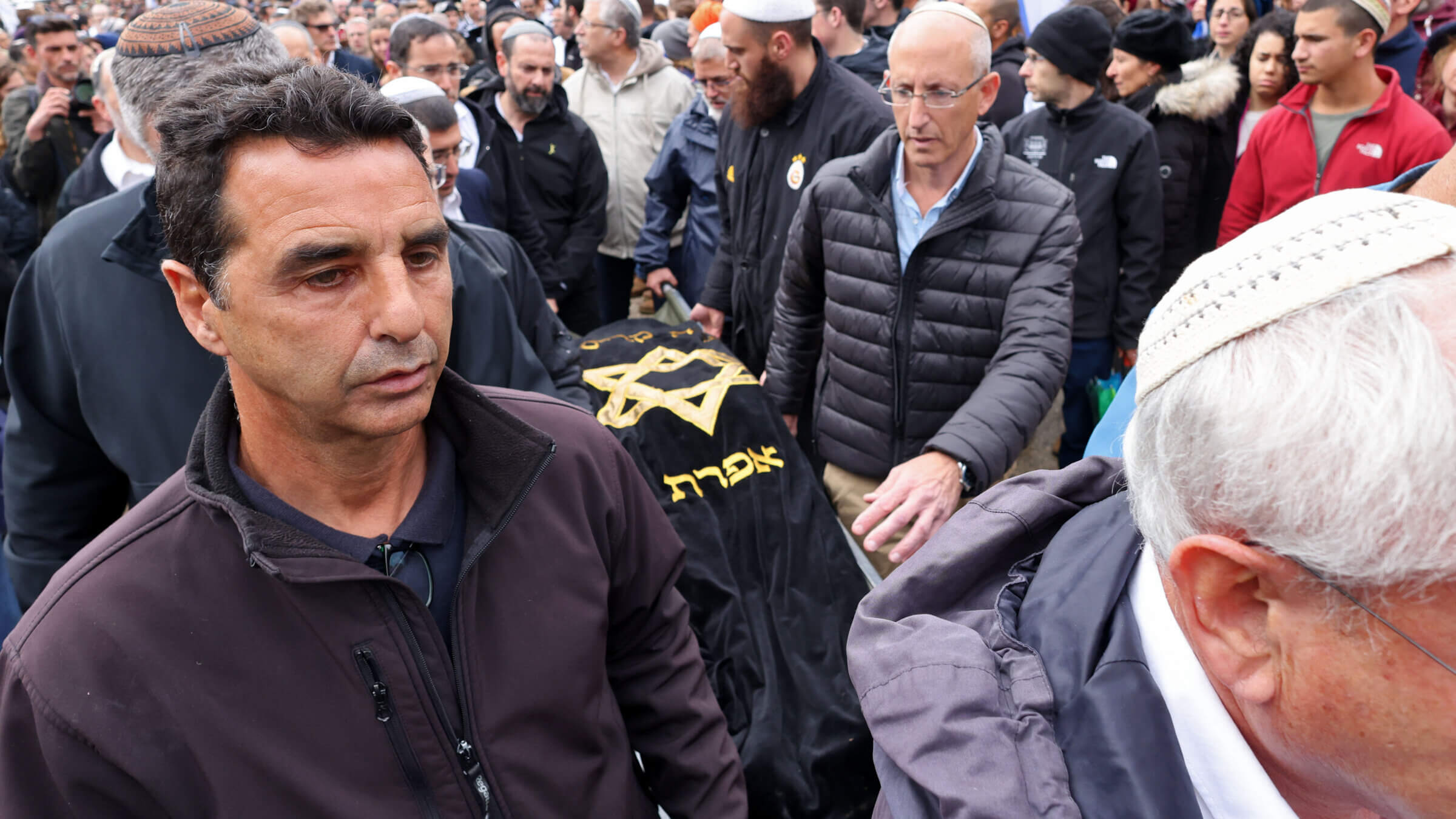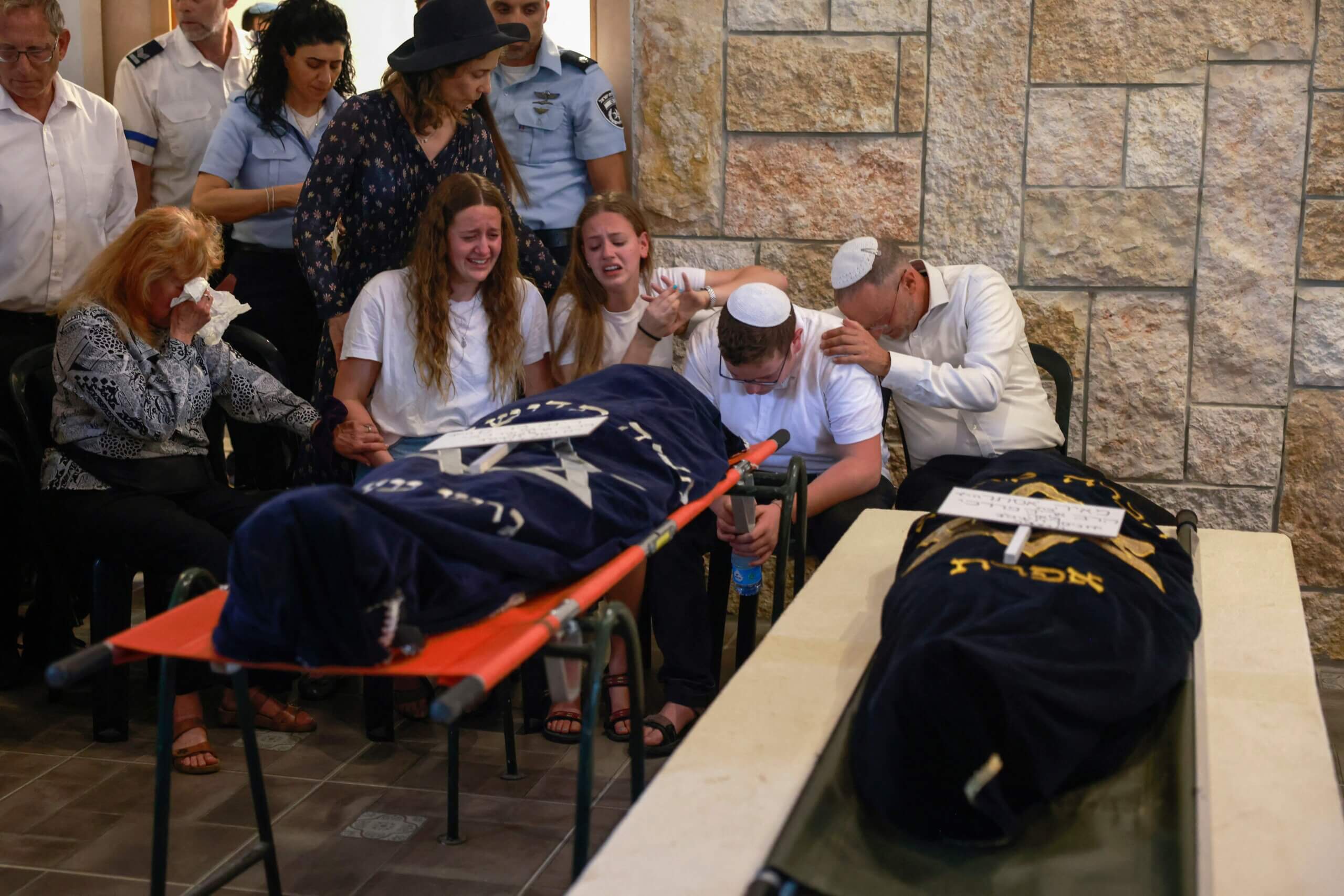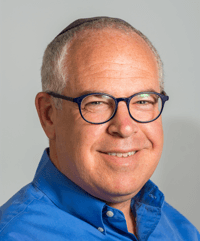Three days, two funerals, one family: my community in Efrat is reeling after a Passover terror attack
Passover is a time for family outings. They shouldn’t be to a cemetery

Mourners carry the body of Lucy Dee, 45, a British-Israeli woman who died of her injuries three days after a suspected Palestinian gun attack, in which two of her daughters were also killed. Photo by Menahem Kahana/AFP via Getty Images
I stood with thousands of my neighbors and countrymen today in the cold rain to do the impossible: Comfort the remaining members of the Dee family as they buried their beloved matriarch, Lucy, two days after the double funeral for two of her five children, 20-year-old Maya and 15 year-old Rina.
I’ve never been to two funerals in the same week. Certainly not for members of a single family, much less ones gunned down by Palestinian Arab terrorists.
But here we were, lining the streets of Efrat as the Dee family drove from their home in my neighborhood to the cemetery a few miles away. News outlets reported that 10,000 people came to the funeral on Sunday. Today there were even more. We had to park a 30-minute walk from the graveyard.

Families stood together, many with children too young to understand what we were doing. Some held hand-printed signs showing love and support, others carried Israeli flags of all sizes. I saw a little boy with a pacifier in his mouth, holding more flags than he was years old.
Along the way on Sunday, neighbors had set up tables with cups and cold water. Today, because of the weather, the tables held hot water for coffee and tea. When tragedy strikes a family and community like this, we all bleed blue and white and are united in solidarity.
Passover is a time to be with family — at the Seder, and on holiday outings throughout the week. It was at the outset of such a family outing that the Dee family was attacked. It was surreal that our family’s outings for the fourth and sixth days were to funerals for two vibrant young women and then their mother, who was 48.
Sunday’s ceremony was particularly awful.
The funeral home near our community of 12,000 residents is made for one burial at a time. There’s a stone slab on which the deceased’s shroud-covered body is placed before burial. With two sisters who were executed together being buried together, a makeshift platform held one of the bodies as they were carried into the packed hall.

The two surviving Dee sisters embraced the shrouded bodies, weeping uncontrollably. Two days later, a similar scenario unfolded as the girls prepared to bury their mother next to their sisters.
My wife, children and I stood outside the building with thousands of others, surrounding it as if in a big hug: family, friends, loved ones and complete strangers. Speakers broadcast the prayers and eulogies into the parking lot.
Amid uncontrollable sobbing and wailing, the girls’ father, Rabbi Leo Dee, found strength to speak meaningfully, trying to find in his daughters’ murder a way for uniting all Israel. His three surviving children also spoke lovingly if gut-wrenchingly.
One of the sisters wept on Sunday as she shared that their “sisters” WhatsApp group would now just be a private chat between the surviving two. Two of the siblings apologized that they were not able to protect their sisters, wishing aloud that they would have taken the bullets for them.
On Sunday, Rabbi Dee had wondered aloud how he would tell his wife that their two daughters were gone when she woke up from her coma. But she did not wake up. Instead, he was burying her. He said at Tuesday’s funeral that he had lost his best friend. Unimaginable.
The Hebrew word for “why” is “lama.” That was the word on everyone’s mind. Why? One of the family members noted in their eulogy on Sunday that “lama” is similar to “le ma,” which translates to “what for?” The Dees and all of Israel are not just asking “Why?” but “What for?” As in, what could come out of this murder?
Some see terrorist murders like these as political. They are not political; they are just evil. They are a product of a theology and ideology that sees Jewish presence in the Land of Israel as being illegitimate, hateful and something to destroy, whether in Jerusalem, Efrat, the Jordan Valley or Tel Aviv.
I was interviewed by a Swedish media outlet after the funeral. I was asked if I was hopeful. I thought of the words of Israel’s former Prime Minister, Golda Meir, who is often quoted as having said that we will only have peace when the Arabs love their children more than they hate ours. It’s still true.
On the way home from Sunday’s funeral, we drove past sites of four previous terror attacks. In my own neighborhood, before driving past the Dees’ house, I passed the home of a friend whose son was killed by terrorists 15 years ago. It was around the corner from the home of a man who was murdered four years ago, and past a park in memory of a soldier from our community who died in service.
We also gave a ride home to a neighbor who was the aunt of one of the three boys who were kidnapped and murdered in 2014, less than a mile from the cemetery where the Dee sisters were buried. It’s all very close to home. Too close.
















